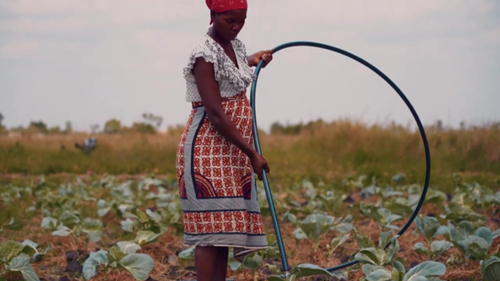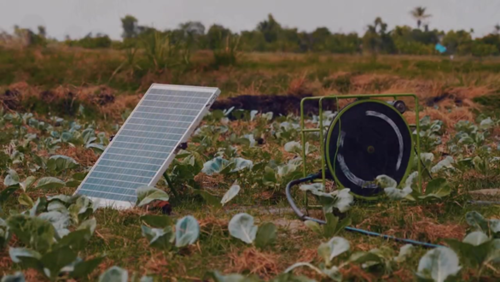Ajuda de Desenvolvimento de Povo para Povo (ADPP) Smallholder Farmers’ Clubs
Project Summary
Majority of the population in Mozambique (80% of which the majority are women[1]) depends on climate-sensitive sectors, mainly rain-fed agriculture, for their food security and incomes. Climate change significantly affects the amount of rainfall, vegetation, and temperature leading to decrease in water availability, dry spells, change in seasonal calendar and reduction in biomass impacting food and nutrition security and capacity to buffer risks through reliance on natural resources.
Ajuda de Desenvolvimento de Povo para Povo (ADPP) started the Farmers’ Club Programme in 2004 and they have the objective of empowering local farmers to take charge of their lives through training, knowledge transfer and capacity development in sustainable farming methods, provision of co-shared farming supplies and equipment, market linkages and development of greater negotiating power in the markets.
The project seeks to improve the lives of small holder farmers, through the adoption of renewable energy technologies. This also enhances the resilience of farmers to effects of climate change. Use of solar water pumping and small irrigation systems in the farmers’ club’s demonstration fields is one of the methods that are used in enhancing production capacity of the small holder farmers.
Location: Zambezia, Sofala, and Tete provinces, Mozambique
Project Period: 2018-2019
Total Funding: In the ambit of the Towards Sustainable Energy for All in Mozambique, ADPP received financial from UNIDO amounting to 214,286 US$ to implement renewable energy systems for productive activities in rural areas in Mozambique. The project also received financial support form MFA Finland.
Stakeholders: ADPP (Implementing agency) , GEF (Funder), UNIDO (Funder) and Smallholder farmers associations (primary beneficiaries)
Impact: The project benefited 4,000 small scale farmers organized in 45 farmers’ clubs who are directly involved in capacity building sessions, installation of systems, and monitoring activities. Farmers through their clubs experienced increased production since the adoption of renewable energy systems for their agricultural activities.
Project Description
The project’s target beneficiaries were farmers connected to the ADPP Farmers’ Club programs in the provinces of Zambezia, Sofala and Tete. As the access to land, water sources, water capacity and climate conditions in the 3 areas are very different, 2 different solar powered systems were introduced; consisting of 65 smaller transportable 80Watt SF1 pumps and 15 bigger fix systems 300 to 2,400 Watt. The solar powered pumping systems have been connected to water irrigation systems and they consisted of water tubes, taps and water hoses.
The SF1 pumps were connected to water wells and small rivers while the bigger systems were connected to rivers and boreholes taking into consideration that the pumping capacity of the solar pumps should correspond to the water capacity of the local water sources. The smaller pumping systems have the capacity to irrigate up to 0.25 ha of land and are designed to pump the water directly to the irrigation fields.The bigger systems have the capacity to irrigate up to 1 ha of land have been combined with water towers and tanks.
Solar powered systems were installed: in the Farmers’ Clubs in the Districts of Maringue, Caia, Nicoadala and Namacurra in the Sofala and Zambezia Provinces; in the Farmers’ Clubs in the Nhamatanda District, Province of Sofala and in the Producers’ Clubs in the Districts of Cahora Bassa and Marara in the Tete Province. The installations are benefitting 4,000 small scale farmers and a total irrigating 31 ha of land.
Selection of Companies
The SPIS companies were selected through a competitive process where a public tender was announced in “Noticias” the principal newspaper in Mozambique and 11 companies made their proposals. 3 credible SPIS companies were identified and subsequently Two companies were selected for the installation of 80 solar powered water pumping systems with the capacity of a total 28.4 kWatt distributed as follows: 8,08 kWatt in the Farmers’ Clubs in Sofala and Zambezia Provinces, 16,72 kWatt in Farmers’ Clubs in Nhamatanda in the Sofala Province and 3,6 kWatt in the Producers’ Clubs in the Tete province.
O&M of the systems
During the installation of the systems, the technicians from the 2 supplier companies, “Water and Irrigation Solution” and “MamboServ” trained the water committees on the procedures and steps to run and perform the maintenance of the systems.
The water committees that benefited from training consisted of 2 women and 2 men and they were involved through the whole installation process.
The topics of the training included, installation and assembly, disassembly, maintenance and safety.
Face to face awareness raising sessions were conducted both, a long period before acquiring the solar pumps and after the project secured the pumps
Farmers were trained on the use and maintenance of solar pumping equipment.
Farming Instructors also conduct continuous monitoring of the project and the clubs’ activities including the installation of the pumps to ensure program quality, effectiveness and accountability
Impact
“By using the solar-powered irrigation system the income of the farmers has been increasing. They have increased in comparison to previous campaigns where farmers were not using the solar irrigation system. Besides, farmers now have the ability to irrigate regularly all year round and are not dependent on rain water”--- President of the Cheia farmers club in Nhamantanda, Sofala province
Due to the project interventions, all 45 Farmers’ Clubs are now registered as associations and are composed of 50 members each with more than 50% women. These groups have received capacity building and development courses such as conservation agriculture, village savings and lending, water harvesting techniques, storage and processing and business planning and management.
4,000 small scale farmers (55% women) now have access to solar powered irrigation systems irrigating a total area of 31 ha of land and enabling them to be productive all year around. The installations coincided with the beginning of the rainy season period in which the farmers normally prepare their fields for cultivating. Many of the small solar pumping systems were for this reason stored away for use in the dry season.
Female small holder farmers registered increased crop production as a result of embracing solar powered irrigation systems and are no longer vulnerable to the impacts of climate change dependent on rainy seasons for crop cultivation.
“By using the irrigation system, the income of the farmers has been increasing in comparison to other farmers who are not using a solar irrigation system. Farmers now have the ability to irrigate regularly all year round and are not dependent on rain water,” ……Jose Paulo Sara, Smallholder farmer, Beira, Sofala Province
Constraint and Recommendation
One of the main challenges with the installation of solar powered equipment in farmers’ fields is the question of theft. The selected SF1 pumps have the advantage of being transportable and can be stored in the farmers’ households at night time while put function during daytime. The bigger systems have fixed structures with solar panels in the fields with no protection at night.
In response the project has adopted the following measures to counter the situation:
- select sites with low criminality;
- train and mobilize the farmers to protect the systems;
- the supplier (Mamboserv) has been requested and responded positively in welding the panels together with the metal structure, so it would be very difficult to disassemble the panels and,
- the water committees have been trained in disassembling the pumps so they can be stored during the night in their households.
One irrigation system model for 1 ha has been developed and installed in 9 of the fields consisting of water tower with tank and irrigation system. The irrigation system is simple consisting of water tubes and water hoses.
In March 2019 the cyclone IDAI hit the central region of Mozambique and the Nhamatanda district was one of the regions that faced the worst devastation and destruction. The whole area was flooded and the farmers lost everything from family members, houses, equipment, tools, documents, their harvest etc. Two of the bigger solar powered systems earlier installed were destroyed by the cyclone and floods. However, with the additional support that ADPP was able to source they were rehabilitated. Additional 9 SF1 pumps (720 Watt) financed by partners supporting the relief process were distributed to the farmers, and this enabled the project to meet the goal of 28 kWatts.
Links
- https://www.unido.org/stories/smallholder-farmers-mozambique-embrace-solar-energy
- Solar Irrigation system in Mozambique, SUPERKWICK LDA
Contact
Elisabeth Kisakye, National Communication expert
1. Agriculture employs 90% of Mozambique’s female labour force and women manage one quarter of all farming households (USAID, 2017). In Gaza 53% of small farms (below 5 ha) are managed by women.





















